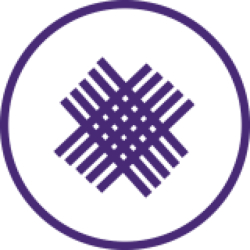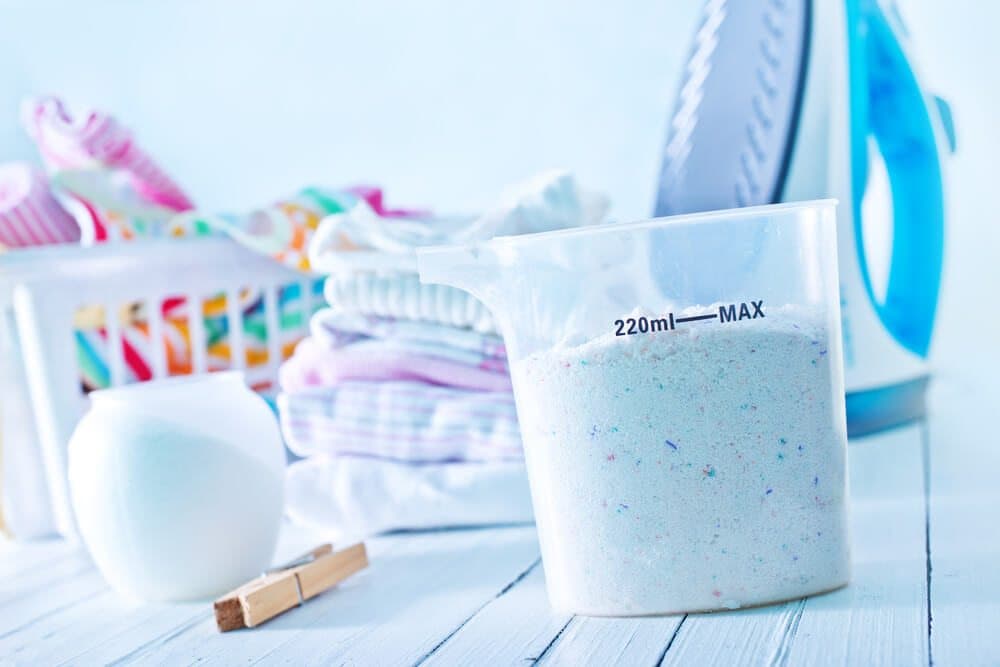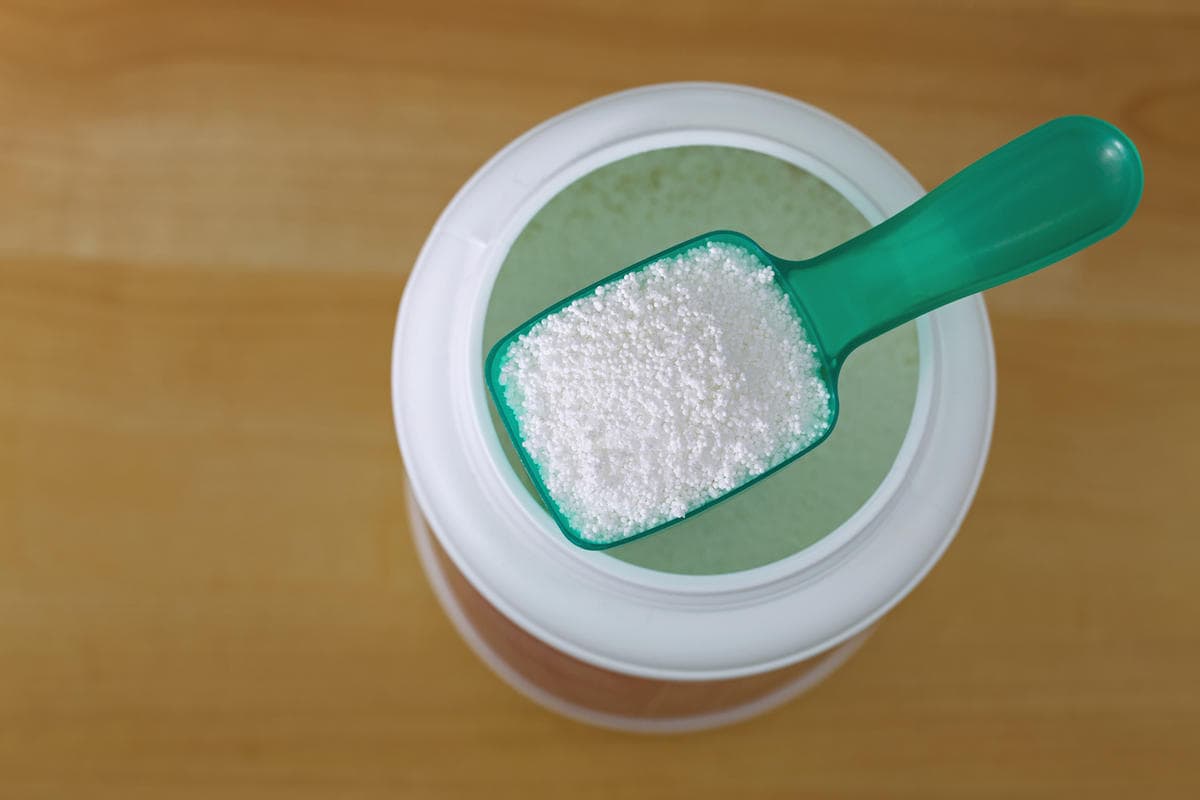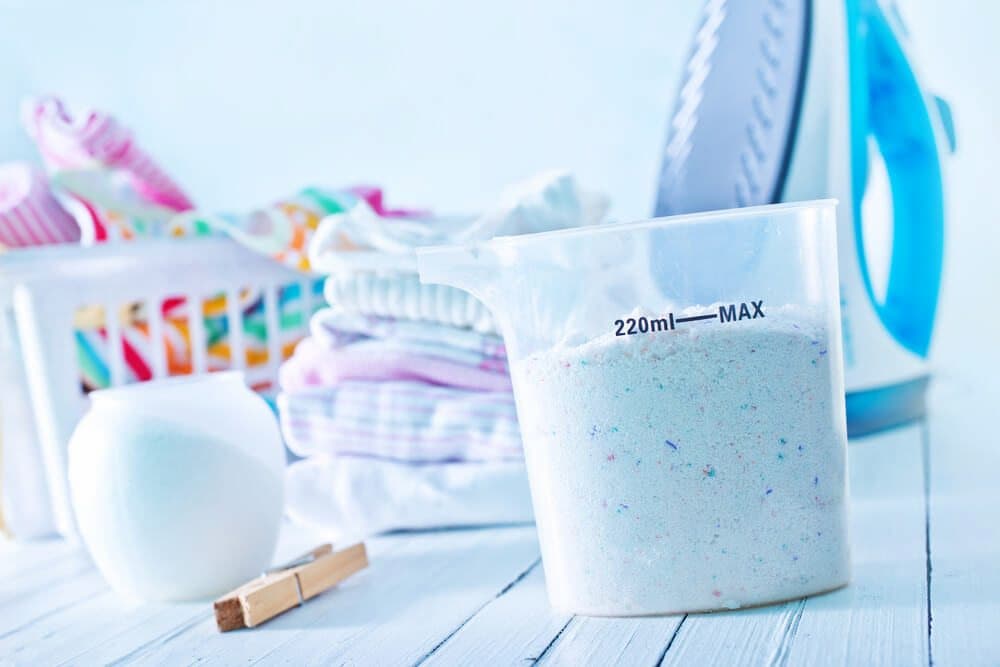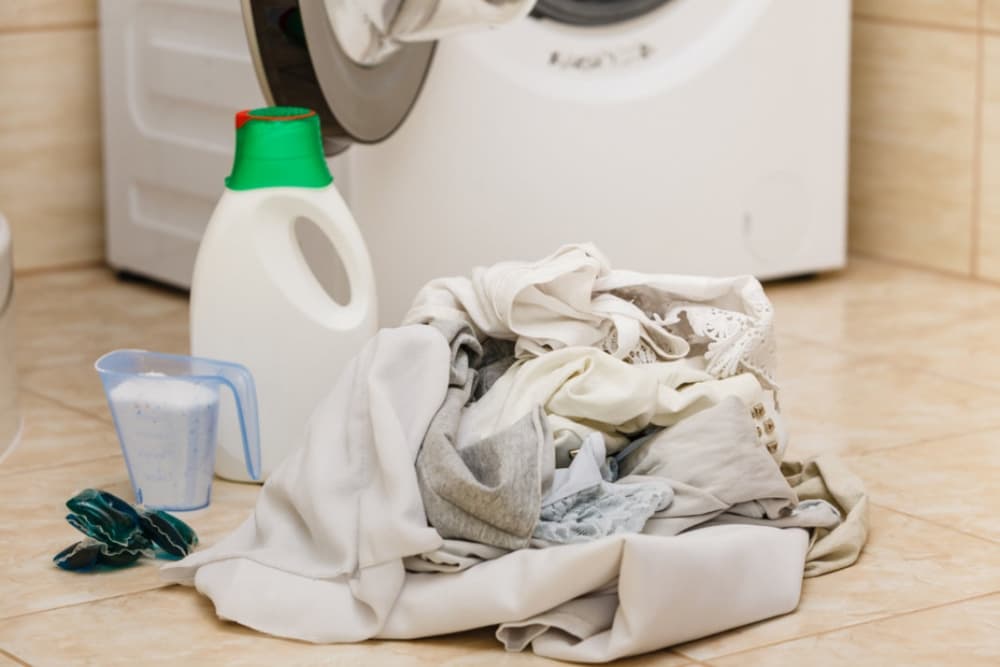Rin Oxiclean Foca Phosphate-Free Laundry Detergent will keep your clothing clean. It’s designed to keep whites clean and bright while also bringing out the vibrancy of colors. The phosphate-free, eco-friendly product is simple to use. The power form of the biodegradable laundry detergent keeps clothes smelling fresh and clean. It’s designed with biodegradable surfactants and enzymes for a gentle, effective wash.
Sodium percarbonate (Na2CO3•H2O2), an adduct of sodium carbonate (Na2CO3) and hydrogen peroxide, is one of the active ingredients in OxiClean (H2O2). When this is dissolved in water, it decomposes producing hydrogen peroxide. These substances degrade in a safe manner in the environment and produce no harmful consequences.
OxiClean Laundry Stain Remover, OxiClean MaxForce Spray, OxiClean Power Paks, OxiClean Triple Power Stain Fighter, OxiClean White Revive, and OxiClean Baby Stain Soaker are all products that are related to OxiClean Laundry Stain Remover.
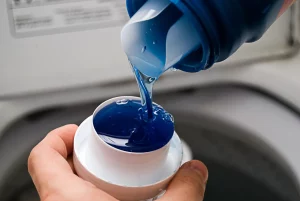
Clorox 2 is a competitor product from the Clorox Company, which contains comparable components but also includes the activator TAED (tetraacetylethylenediamine), which converts peroxide to peracetic acid (also known as peroxyacetic acid, or PAA).
Biz Laundry Booster, a competitor, has added enzymes to break down organic stains and promises to exceed OxiClean in several ways. Foca laundry detergent brightens whites and brings out the vibrancy of colors. This eco-friendly solution is simple to use and free of phosphates, making it gentle on clothing.
It Washes clothing effectively and softens them. It comes in a powder form that may be applied on loads quickly and evenly. After washing the garments are left smelling fresh and clean. Biodegradable surfactants and enzymes are also used in the formulation.
Detergent OxiClean
OxiClean’s chemistry is a fascinating example of using naturally available ingredients to create new goods such as detergent. The OxiClean components decompose into the water, oxygen, and soda ash, which are all safe and biodegradable.
OxiClean is both environmentally and septic-system friendly. The products do not hurt living creatures, according to the OxiClean firm, because they are produced using substances found naturally in the environment. When they’re flushed down the sink, they break down into harmless chemicals like water and soda ash (plant ash), so they won’t impact septic systems.
Finally, unlike other cleaners, they do not include chlorine, so they will not harm your skin or delicate materials. The OxiClean products are ideal for organic stains, but they can also be used to remove inorganic stains like pen ink, spilled computer printer ink, and other disasters.
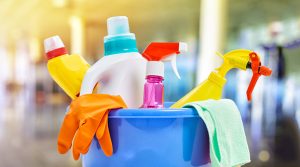
Orange Glo International owns the chemical of OxiClean as a trade secret. The product’s key constituents, according to OxiClean, are sodium percarbonate, sodium carbonate, surfactants, polymer, and water (either in the solution or added to a dry powder).
Oxygen is an essential fundamental gas for human life. Orange Glo International Company scientists came up with the notion of harnessing oxygen’s molecular structure and using it as a cleaning agent. When you use OxiClean, you’ll hear a bubbling sound as oxygen releases and binds with the organic and inorganic chemicals in the stain to lift them away. OxiClean is a biodegradable cleaning product.
foca detergent
One of the most prevalent household goods in our houses is laundry detergent. So, what is the difference between biodegradable detergents like Foca and regular laundry detergent?
To begin with, biodegradable laundry detergent is made up of components (most notably surfactants) that can degrade in a fair length of time once they enter our ecosystems. Nature’s microorganisms get to work on these substances, ensuring that no trace of them is left behind.
These components do not have any negative effects on the environment. When all of the surfactants in a detergent product decompose by more than 60% in 28 days under aerobic conditions–in the presence of air–it is termed biodegradable in Europe.
Conventional laundry detergent, on the other hand, is made up of petroleum-based substances, dyes, synthetic perfumes, and other chemicals that do not fully break down, polluting our waterways and ecosystems.
Some of the components in traditional laundry detergent are even harmful to people’s health. Take, for example, petroleum distillate. It’s a surfactant that’s found in most traditional detergents. Despite this, it has been discovered to harm mucous membranes and the lungs, among other things.
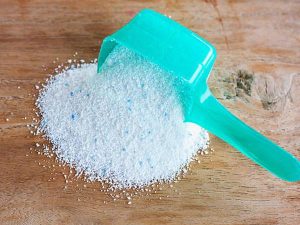
Rin detergent
Hindustan Unilever first produced Rin Detergent Powder in 1969, along with a blue colored cake soap for washing clothing. Rin has become a staple in the grocery lists of every Indian housewife, making it a major success and an iconic brand. Rin Matic for washing machines and Rin Ala, a bleach and stain removal detergent, were later introduced by the business.
Rin, which used to only come in one color, now comes in a variety of scents. Despite tough competition from Surf, Tide, Aerial, and Nirma Rin, Surf, Tide, Aerial, and Nirma Rin, Surf, Tide, Aerial, and Nirma Rin, Surf, Tide, Aerial, and Nirma Rin continue to be a popular detergent brand.
Nothing should get in the way of your radiance, according to Rin. Each of you is gifted and deserving of the chance to shine. Rin claims to make your garments whiter and brighter, giving you the courage to keep moving forward on your path to success.
These are Rin products:
- Rin Bar: is a water-saving bar that was launched in 2016 in key markets to solve India’s escalating water stress. Rin Bar now offers garments the same brilliant shine while using half the amount of water.
- Rin detergent powder: first introduced to the market in 1994. Rin Refresh is a continuation of the iconic Rin brand, which stood for whiteness in washing and introduced the smell of lemon and rose, which enters every fibre to offer the same brightness and freshness, boosting confidence all day.
- Rin Ala: This product bleach was a logical development for the brand because it was another ‘whiteness’ solution for many Indian households.
- Rin Matic: is a specialty washing machine powder developed in response to the observation that regular powders do not work well under machine wash conditions, therefore filling a gap in the market.
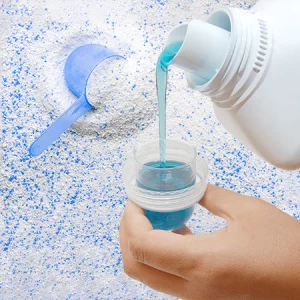
Detergent merge mansion
Merge Mansion is an Android and iOS mobile game that was released in 2020. The player must clean the dirt by using detergents. This is Metacore’s debut game. According to Merge Mansion’s YouTube channel’s about page, the company is based in Finland. It has been downloaded over 10 million times as of August 16, 2021. It made $38.6 million in less than a year.
However, it was Metacore’s marketing in support of the game that put Merge Mansion on the map. Ads for the game were regarded as “weird,” “dramatic,” “plot-driven,” “interesting,” and “virality-driven.” On April 16th, 2022, the official gameplay soundtrack “Merge Mansion (Official Gameplay Soundtrack)” was published. There were songs on the album.
The story is as follows;
“This mansion is full with unbelievable tales!” “Assist Maddie in learning what her grandmother has to say about the family’s exciting past,” reads the game description. “Wipe away the dust to discover new items, combine them into useful tools, and receive unexpected rewards.”
Maddie’s grandmother hands her the keys to a gate, and she discovers a mansion behind it. After arriving at the Mansion, Roddy Took, a Building Inspector, appears and informs her that the house must be demolished since it is unsafe. He suggests that if Maddie cleans up the drive way and then goes, it won’t have to come down.
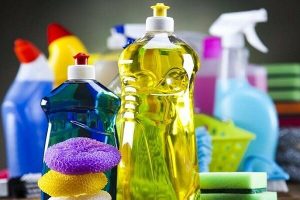
zep laundry detergent
Zep, Inc. is a cleaning products firm situated in Atlanta, Georgia. It specializes in industrial, institutional, food and beverage, vehicle care, and retail cleaning laundry detergents and maintenance products. Zep’s product range includes over 80 brands, including the Rain-X and Armor All professional lines. Zep employs around 2,000 individuals as of 2019.
Mandle Zaban, William Eplan, and Saul Powell founded Zep in 1937. The company made industrial and janitorial cleaning solutions and set itself apart from competitors by touting its proprietary product compositions and emphasizing its personal customer service. After acquiring Zep in 1962, National Linen Service changed its name to National Service Industries (NSI) to better reflect the company’s services.
Following the acquisition, Erwin Zaban, son of co-founder Mandle Zaban, stayed on to administer Zep and later became president of NSI in 1966. NSI broke off its chemical and lighting operations into its own publicly-traded company in 2001 as a result of lower earnings and a worsening economy.
It was founded in June 2001 as L&C Spinco and renamed Acuity Brands in November of the same year. Acuity Brands initially struggled due to economic conditions, but restructuring initiatives in 2005 increased revenues, prompting the business to separate into two different publicly traded brands in July 2007. Acuity Specialty Products, a chemical branch of Acuity Trademarks, was spun out under the name Zep, Inc., and featured the Zep, Zep Commercial, Enforcer, and Selig brands.
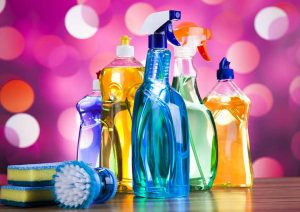
Zep, Inc. continues to grow as a stand-alone business. In 2010, it bought Waterbury Companies and Amrep, and in 2012, it bought Ecolab’s vehicle-care division. A fire at an Amrep manufacturing plant in Marietta, Georgia in 2014 exposed a history of safety and environmental difficulties at the business dating back to at least 1989, long before Zep bought it.
The fire did not cause any injuries or deaths, and EPA air quality studies revealed that the smoke was not harmful. The Georgia Environmental Protection Division, on the other hand, ruled that discharge chemicals and firefighting foam were likely to blame for a fish kill in Sope Creek downstream from the site.
New Mountain Capital, a private equity firm, agreed to buy Zep for $460 million in April 2015, taking the company private. The purchase was unanimously authorized by Zep’s board of directors. The merger was authorized by 99.3 percent of stockholders in a vote held in June 2015.
With the acquisition of AFCO in July 2017, the company expanded its product offering to include a business sector for the food and beverage industry. Food processing sanitation and safety products were developed by AFCO. Dan Smytka, Zep’s current CEO, was hired in September of this year.
Yes detergent
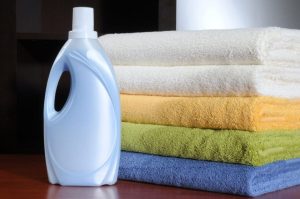
P&G launched YES detergent in Lebanon in the 1950s, and Transmed has been the distributor since then. Transmed bought the brand from P&G in 2015 and opted to relaunch it in a new package with an updated recipe. The new formula is more powerful, produces more foam, and, most importantly, has a strong smell.
This detergent can be used for a variety of purposes. Cleans grease and other food process soiling off tables, conveyors, processing lines, trays, floors, and walls, among other places. Also used as a general detergent in canteens and as a dishwashing liquid in sinks.
